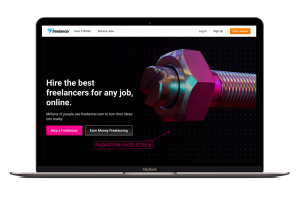Top Freelancing Tools
Top Business Management Tools to Thrive as a Freelancer
Embarking on a freelance journey, with its promises of flexible hours, additional income, and personal fulfilment, requires a significant shift from the security and infrastructure of the corporate world to becoming a sought-after contractor.
Besides your actual skill set, you will need to implement several business workflows that will track client projects, log activity and automate several day-to-day tasks. Manually maintaining these tasks will not increase productivity.
Australia’s Freelancing Hub has put together some top freelancing tools that offer suggestions and solutions for thriving in the gig economy.
- Create a Business Plan
- Project Management Tools
- Time Tracking Tools
- Accounting & Invoicing Tools
- Marketing Tools
BONUS: Interpersonal Skills
1. Create a Business Plan
A freelance business plan is a document that will help you define your business goals and the strategies for achieving them. It’s integral to clarify a business model and not wing it. Freelancers are structured individuals and this process will provide valuable insight into how you operate.
Create a plan about what you offer that’s exceptional, how much you charge, when you work, who you work for and what you aim to achieve in the short term and long term. Your freelancing business plan should be a living document, meaning that you should use it to help guide your work, but also be flexible enough to change as your career evolves.

- Define your business goals
- Refine a profitable skill set
- Identify your clients
- Generate leads
- Establish work process and boundaries
- Network your community
- Identify mentors
2. Project Management Tools
Project management tools are essential for any freelancers or small businesses that want to manage their projects effectively. They help organise deliverables, track time and costs, plus communicate with team members or sub-contractors.
The first step in selecting a project management tool is determining what your needs are. What do you want to be able to do with the project management software? How many users will need access to it? What platforms will they need access from? How much control do you want over the process? Project lifecycle including deadlines and deliverables is crucial, plus hierarchical task management as well as reporting and analytics.
3. Time Tracking Tools
When you work from home, time tracking is the only way to know how much time you spend on different types of jobs. It’s also an excellent way for new businesses to get a handle on their costs.
By keeping accurate records of exactly how long each type of job takes, you’ll be able to adjust and improve your quotes. If you use time tracking software, you can run reports instantly on different types of tasks and the times taken to complete them. This will help you monitor how much time you’re spending on specific projects so that they don’t get out of hand.
Time tracking software can also help with invoicing: once you’ve logged all your hours, it’s a simple matter of adding them up and sending out your invoice!
4. Accounting Tools
The best freelance accounting tools will give you the ability to track cash flow and keep your books in order. This helps you understand how much money is coming in, and whether or not you’re making a profit.
When choosing accounting software, it’s important they offer the following features:
- Tracking Income And Expenses
- Tracking Time Spent On Projects
- Sending Accurate Invoices
- Tracking Invoice Payments
- Invoicing In Multiple Currencies
- Tracking Invoices That Have Been Sent Out
- Providing Various Payment Options
- Tracking Overdue Invoices
- Tracking Your Tax Payments For The Year
There’s a substantial number of free accounting software and invoice apps for freelancers, entrepreneurs, and small businesses, but you have to determine what works for your needs. Do you need to alleviate the stress of determining your taxes at the end of the financial year? Is automation your best productivity hack? Do you need to manage client expenses? Find the best freelancing invoicing tool that works as hard as you do.
5. Marketing Tools
Marketing is an essential part of a freelancer’s business: if you’re a digital freelancer then digital marketing is a must. You need to spend time networking, building your portfolio, and getting solid reviews and case studies. You don’t need to blow the bank to make an impact, but you do need some practical marketing tools to promote your business and see that ROI.
- Canva: Brilliant tool for making pretty graphics and images. They have templates that make it easy to create images for your social media accounts, blog posts and even print materials like business cards and banners.
- Content Marketing: Create killer content. Take some time to learn about good writing from sites like Copyblogger or HubSpot. Then write well-researched blog posts that will help people and show them what you can do for them!
- Email Marketing: Build your email list. No matter what you do online, email is still the best way to reach people. If you can’t afford Mailchimp, try Aweber, or if you’re really strapped for cash, just start by building an email list in Gmail directly.
- Grammarly: A lifesaver for your copywriting—it catches spelling mistakes, grammar errors and contextual mistakes that might not be caught by spellcheck alone.
- Google! The king of free stuff. Their SEO tool and keyword research tool are invaluable to newbies and seasoned pros alike.
BONUS: Interpersonal Skills
Freelancing is for entrepreneurs, not employees.
Soft skills are interpersonal characteristics and traits that allow people to thrive in the work environment. They range from communication to persuasion, critical thinking and conflict resolution. Cultivating these skills should be an ongoing part of your professional development because being your own boss means expanding into sales, client management, consulting, and appraisal.
Do you have the mindset to succeed as your own boss? Download our FREE eBook – The Freelance Mindset now.
Freelancing can provide the best work-life balance on the planet but you must be motivated, agile and resilient. Education plays an important part in that success: sharpen the tools of your craft constantly and upskill via freelancing courses regularly. Make yourself vital to your clients.



